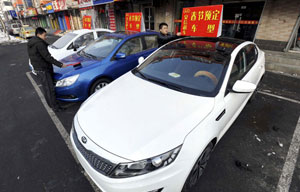New Zealand tourism officials set targets for boosting Chinese visitor numbers
WELLINGTON, Jan 29 -- The New Zealand government's tourism agency on Tuesday unveiled targets for boosting the number of Chinese visitors and their average length of stay.
Tourism New Zealand general manager Asia markets Tony Everitt said that by 2016 the agency was aiming to raise the proportion of "premium" Approved Destination Status (ADS) Chinese visitors from 12 percent to 30 percent of the total ADS visitors.
The agency was also aiming to increase the ratio of free independent travelers from 12 percent to 25 percent of the total Chinese visitors to New Zealand and raise the average number of days stayed in the country from six to eight.
"Currently, most Chinese tourists visit New Zealand for three days as part of a tour group on a dual-destination package that also goes to Australia," Everitt said in a statement.
"However, tourists traveling independently, or who come on New Zealand-only tours, are increasing in number and value. These travelers generally spend far more time here, visit more regions, have more discretionary spending power and enjoy a higher quality experience."
In November last year, the Chinese mainland overtook the traditional U.S. and British markets to become New Zealand's second-largest source of annual arrivals, with around 195,000 Chinese visiting New Zealand in the 12-month period, an increase of 38 percent year-on-year, he said.
Arrivals from China had increased steadily since 1999, when New Zealand gained ADS, which cleared the way for Chinese tour groups to visit.
"The on-going potential from this market is clear. However, in order to realize the benefits this market offers to the tourism industry there are some unique challenges to overcome - primarily increasing the length of stay and the number of activities and experiences Chinese visitors partake in while they are here," he said.
Earlier this month, Tourism New Zealand initiated its Premium Kiwi Partnership (PKP) program, developed to generate greater value from the Chinese market by targeting travelers likely to spend more time and money in New Zealand.
"Tourism New Zealand was working with 12 selected inbound tour operators and 18 China-based travel sellers to develop and market innovative packages offering longer-stay, higher-quality itineraries," said Everitt.
"Through PKP and our other China marketing initiatives, we aim to change the nature of holidays taken by Chinese visitors and the contribution they make to the New Zealand economy."
|
|
















